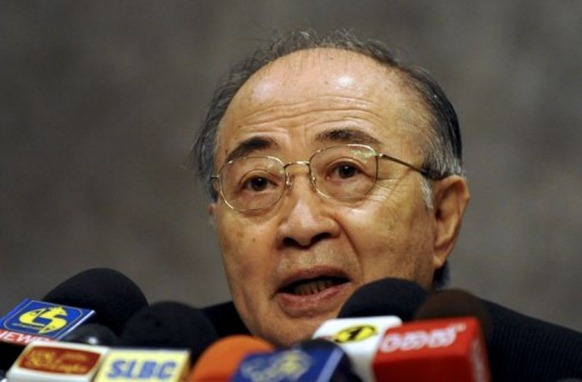 A visiting Japanese envoy said Sunday his country backed efforts by the United Nations to investigate alleged war crimes committed in Sri Lanka during the final months of its ethnic conflict.
A visiting Japanese envoy said Sunday his country backed efforts by the United Nations to investigate alleged war crimes committed in Sri Lanka during the final months of its ethnic conflict.
Yasushi Akashi, whose country is a major donor to Sri Lanka, ended a five-day visit saying he detected a "lack of flexibility and openness" in the government’s attempts to promote reconciliation on the island.
His remarks followed an announcement by the UN that a panel would be named this week to advise Secretary General Ban Ki-moon on accountability in Sri Lanka.
The panel is seen as a precursor to a full war crimes probe into the last months of the conflict, when government troops finally defeated the Tamil Tiger separatist rebels in May 2009 after decades of bloodshed.
The UN has said that at least 7,000 civilians were killed in the first four months of fighting last year.
The war ended when the military killed the leadership of the Liberation Tigers of Tamil Eelam (LTTE), which had been fighting for independence since 1972.
Akashi said he had pressed Colombo to allow the UN to get involved in Sri Lanka’s reconciliation process.
"The government listened to what I said. (But) I feel there is a lack of flexibility and openness," Akashi told reporters.
He said Ban’s upcoming panel "would be useful", although Colombo has opposed an international probe on its conduct in the war and has resisted any calls for an independent investigation.
"It (the UN) could provide experiences and insights. The purpose of it is not to interfere with Sri Lanka’s own panel, but to offer ideas and suggestions if needed," Akashi said, referring to a separate commission appointed by Colombo.
Sri Lanka has said its own commission would address the underlying causes of the conflict as part of the island’s healing process, but it has no mandate to probe war crimes.
Akashi said Japan still has a role to play as Sri Lanka goes through a "sensitive period to achieve genuine peace."
(For updates you can share with your friends, follow TNN on Facebook and Twitter )
